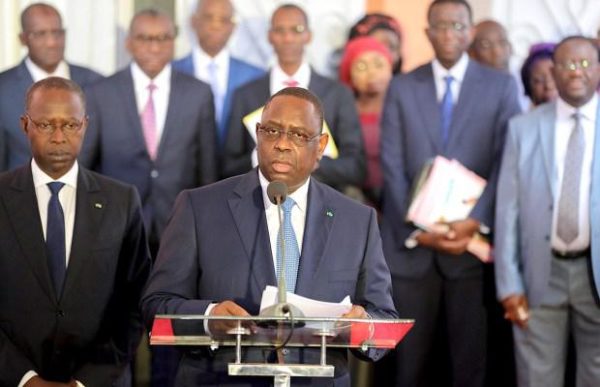In Senegal, the planned disappearance of the post of prime minister seems to have stolen the limelight from the list of 32 ministers fell yesterday in the early evening. Beyond the progressive reform that devotes Mahammed Boun Abdallah Dionne, Minister of State, temporarily renewed Prime Minister, Secretary General of the Presidency, this change should let the President of the Republic come to present its general policy in Parliament. A sort of American-style exercise that moves the Senegalese constitution away from the Fifth French Republic from which it was inspired and, in our opinion, places the Head of State directly in front of the deputies.
In addition to reducing the verticality of the chain of command, in favor of rapid execution of development projects (priority of priorities for a president who wants to leave a lasting impression in the minds of his fellow citizens), the current configuration answers some part of the injunctions of development partners (IMF in the lead) on the reduction of the State’s operating expenses. It remains to be seen whether the suppression of the ministry, a significant effort if any, is sufficient within the meaning of the Bretton Woods doctrines.
The other lesson to be learned from government formation is the separation between finance and economics. The departure of Amadou Bâ to Foreign Affairs after five years in the office of great financier of the country allows President Macky Sall to entrust Finance and Budget to Abdoulaye Daouda Diallo, former Minister of the Interior, formerly Minister of Land Transport Infrastructures and opening up, a faithful to the president doubled by a double nature of technocrats and politicians. The Inspector of Taxes and Domains will not have a state of grace in view of emergencies.
As for Economy, Planning and Cooperation, he goes to Amadou Hott, previously Vice President of the African Development Bank in charge of Energy. As we wrote a few days ago, the separation of Finance on the one hand, and Economy and Plan on the other hand, allows the latter department to bear the heavy responsibility for strategic planning and identification of development priorities. Finance is responsible for financing the day-to-day management of macroeconomic balances, the mobilization of resources and, we hope, the anticipation of the decisions of the State both in terms of international issues and levies at the regional level. Among the strategic ministries, there is that of Oil and Energy entrusted to Mamadou Makhtar Cissé, a leading politician in the Walo zone. Until then General Manager of the Senelec, electricity distributor, (which has managed to significantly reduce load shedding), Mr. Cissé will have the privilege of affixing his signature at the bottom of the first delivery sheet of Senegalese gas and oil.
Another loyal promoted, Me Oumar Youm, who inherits the Ministry of Infrastructure, Air Transport and opening up. Behind this ministry, that of Tourism and Air Transport, entrusted to Alioune Sarr, should find its place.
The Ministry of Urban Planning, Housing and Public Hygiene went to Abdou Karim Fofana, who had previously been in charge of the management of the State Built Heritage Agency. A list of this tighter team should succeed appointments in the coming days in different branches of the state.
List of the new Senegalese government
Sidiki Kaba, Minister of the Armed Forces
Aly Ngouille NDIAYE, Minister of the Interior
Aboulaye Daouda Diallo, Minister of Finance and Budget
Amadou BA, Minister of Foreign Affairs and Senegalese from outside
Malic SALL, Minister of Justice, Minister of Justice
Mansour FAYE, Minister of Community Development for Social Equity
Mamamdou Makhtar CISSE, Minister of Petroleum and Energy
Mariama SARR, Minister of the Public Service
Oumar Youm, Minister of Infrastructure, Air Transport and Disengagement
Amadou Hot, Minister of the Economy, Planning and Cooperation
Abdoulaye Diouf Sarr, Minister of Health and Social Action
Moussa Baldé, Minister of Agriculture and Rural Equipment
Serigne Mbaye Thiam, Minister of Water and Sanitation
Ndèye Saly Diop DIENG, Minister of Women, Family, Gender and Child Protection
Alioune Sarr, Minister of Tourism and Air Transport
Aminata Mbengue Ndiaye, Minister of Fisheries and Maritime Economy
Mamadou Talla, Minister of National Education
Oumar GUEYE, Minister of Territorial Collectivities and Territorial Development
Sheikh Oumar Hann, Minister of Higher Education, Research and Innovation



